Searched: Reading
News
Victim says she wants accountability more than money.
 Hillsong Church Australia’s legal settlement with a former student who was groped by a worship leader fell apart on Thursday when the survivor refused to sign a non-disclosure agreement.“I will not give up my voice,” Anna Crenshaw, daughter of Pennsylvania megachurch pastor Ed Crenshaw, told Australian reporters. “This has never been about money for me but about justice and accountability.”According to lawyers, one condition of the agreement was a joint statement saying the church reported the assault immediately. Crenshaw claims Hillsong—embroiled at the time in a scandal over founder Brian Houston’s failure to report his father Frank’s sexual abuse of a young boy—actually waited four or five months to contact police.Crenshaw was studying at Hillsong College in 2016 when Jason Mays, an administrative staff member and volunteer worship leader, put his hand on her inner thigh. The young woman—18 at the time—got up to leave, but Mays, 24, grabbed her, wrapped his arms around her waist, and touched her legs, butt, and crotch, according to a statement Crenshaw wrote several years later.“He lifted up my shirt and was kissing my stomach,” Crenshaw, now 26, said in a TV news interview. “So I’m just, like, stuck there with this guy groping me.”Crenshaw did not immediately report the incident because, she said, she was ashamed.She also didn’t believe she could report Mays to human resources, because the department was run by Mays’s father. Two years later, a counselor pushed her to report to someone, and Crenshaw went to the head of pastoral care, who said, “I’m sure he’s really sorry,” according to ...Continue reading... Hillsong Church Australia’s legal settlement with a former student who was groped by a worship leader fell apart on Thursday when the survivor refused to sign a non-disclosure agreement.“I will not give up my voice,” Anna Crenshaw, daughter of Pennsylvania megachurch pastor Ed Crenshaw, told Australian reporters. “This has never been about money for me but about justice and accountability.”According to lawyers, one condition of the agreement was a joint statement saying the church reported the assault immediately. Crenshaw claims Hillsong—embroiled at the time in a scandal over founder Brian Houston’s failure to report his father Frank’s sexual abuse of a young boy—actually waited four or five months to contact police.Crenshaw was studying at Hillsong College in 2016 when Jason Mays, an administrative staff member and volunteer worship leader, put his hand on her inner thigh. The young woman—18 at the time—got up to leave, but Mays, 24, grabbed her, wrapped his arms around her waist, and touched her legs, butt, and crotch, according to a statement Crenshaw wrote several years later.“He lifted up my shirt and was kissing my stomach,” Crenshaw, now 26, said in a TV news interview. “So I’m just, like, stuck there with this guy groping me.”Crenshaw did not immediately report the incident because, she said, she was ashamed.She also didn’t believe she could report Mays to human resources, because the department was run by Mays’s father. Two years later, a counselor pushed her to report to someone, and Crenshaw went to the head of pastoral care, who said, “I’m sure he’s really sorry,” according to ...Continue reading... |
Migrant rights have been off-radar for many Panamanian Christians. But as pressures increase, some are speaking out ahead of this weekend's general elections.
 On May 5, Panamanians will vote for a new president. The outcome of this election may have consequences for far more than its 4.4 million residents; it could change the migration reality for the hundreds of thousands of people traveling from South America, Asia, and Africa who pass through the Central American country en route to the United States.Leading in the polls is José Raúl Mulino, a candidate for Realizando Metas (Realizing Goals), a right-wing populist party founded by disgraced president Ricardo Martinelli. He has vowed to shut down the Darién Gap, a densely forested jungle area that migrants must traverse to enter Panama from the bordering country of Colombia.“We’re going to close Darién and we’re going to repatriate every one of these people, respecting their human rights,” said Raúl Mulino in April.For many Panamanians, there was no migrant crisis before 2022. After passing through the Darién gap, migrants passed through the country on government buses to the Costa Rican border. But after a shift in US migrant policy sent many back to Central America a couple years ago, hundreds have since moved to Panama City and a handful of small towns. Residents have begun to blame them for crime and for overwhelming their sanitation systems.Though evangelicals have largely been on the sidelines, many leaders say they should have done more.“The church does not see the refugee problem as their own problem,” said Panamanian missionary Robert Bruneau, a regional leader with United World Mission. “They believe it is something the state should do and are not aware of the great opportunity they have to graciously and honorably serve someone who ...Continue reading... On May 5, Panamanians will vote for a new president. The outcome of this election may have consequences for far more than its 4.4 million residents; it could change the migration reality for the hundreds of thousands of people traveling from South America, Asia, and Africa who pass through the Central American country en route to the United States.Leading in the polls is José Raúl Mulino, a candidate for Realizando Metas (Realizing Goals), a right-wing populist party founded by disgraced president Ricardo Martinelli. He has vowed to shut down the Darién Gap, a densely forested jungle area that migrants must traverse to enter Panama from the bordering country of Colombia.“We’re going to close Darién and we’re going to repatriate every one of these people, respecting their human rights,” said Raúl Mulino in April.For many Panamanians, there was no migrant crisis before 2022. After passing through the Darién gap, migrants passed through the country on government buses to the Costa Rican border. But after a shift in US migrant policy sent many back to Central America a couple years ago, hundreds have since moved to Panama City and a handful of small towns. Residents have begun to blame them for crime and for overwhelming their sanitation systems.Though evangelicals have largely been on the sidelines, many leaders say they should have done more.“The church does not see the refugee problem as their own problem,” said Panamanian missionary Robert Bruneau, a regional leader with United World Mission. “They believe it is something the state should do and are not aware of the great opportunity they have to graciously and honorably serve someone who ...Continue reading... |
After this week's UMC votes on LGBTQ issues, African Methodists should join American conservatives in the new Global Methodist denomination.
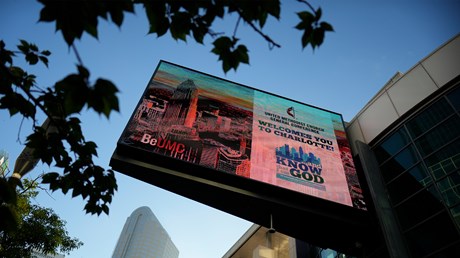 That was fast. In the first General Conference since the most conservative congregations disaffiliated, the United Methodist Church liberalized its teachings on marriage, sexuality, and the ordination of LGBTQ clergy.In other mainline denominations, like the Evangelical Lutheran Church in America and the Presbyterian Church (USA), the conservative exodus has tended to come after the progressive victory. But in the UMC, the conservative American contingent is already gone, so the vote wasn’t close.With that settled, the next and perhaps final battle between American Methodists who have been on opposite sides of theological and social issues for more than half a century will concern who can win over the Africans, who have been the “main group opposing the changes in policy” on sexuality and are also the largest UMC contingent outside the United States. The breakaway conservative denomination called itself the Global Methodist Church in no small part because members hoped to remain in fellowship with churches in the Global South, where Methodism is more orthodox—and growing as Methodism in the US hasn’t in years.But the United Methodist Church has also set in motion a plan to allow regional autonomy on the very issues that broke up the denomination domestically. This would permit African churches to remain traditional in how they define marriage and—so the pitch goes—otherwise insulate themselves from the Americans’ liberal course.African Methodists have previously rejected similar proposals, likely understanding how such rules would dilute African churches’ influence over the denomination and exempt leaders of the shrinking US church from accountability ...Continue reading... That was fast. In the first General Conference since the most conservative congregations disaffiliated, the United Methodist Church liberalized its teachings on marriage, sexuality, and the ordination of LGBTQ clergy.In other mainline denominations, like the Evangelical Lutheran Church in America and the Presbyterian Church (USA), the conservative exodus has tended to come after the progressive victory. But in the UMC, the conservative American contingent is already gone, so the vote wasn’t close.With that settled, the next and perhaps final battle between American Methodists who have been on opposite sides of theological and social issues for more than half a century will concern who can win over the Africans, who have been the “main group opposing the changes in policy” on sexuality and are also the largest UMC contingent outside the United States. The breakaway conservative denomination called itself the Global Methodist Church in no small part because members hoped to remain in fellowship with churches in the Global South, where Methodism is more orthodox—and growing as Methodism in the US hasn’t in years.But the United Methodist Church has also set in motion a plan to allow regional autonomy on the very issues that broke up the denomination domestically. This would permit African churches to remain traditional in how they define marriage and—so the pitch goes—otherwise insulate themselves from the Americans’ liberal course.African Methodists have previously rejected similar proposals, likely understanding how such rules would dilute African churches’ influence over the denomination and exempt leaders of the shrinking US church from accountability ...Continue reading... |
An ancient codex, containing perhaps the earliest complete versions of Jonah and 1 Peter, goes up for auction in June. Will it disappear?
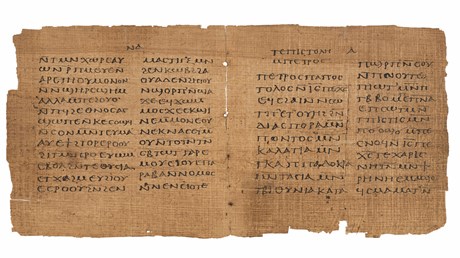 One of the oldest books in existence, which contains what is perhaps the oldest complete versions of Jonah and 1 Peter, is going up for auction in June. The sale of the Crosby-Schøyen Codex has scholars excited to talk about its uniqueness—and nervous about whether it could go into private hands and disappear.The Crosby-Schøyen Codex is a primary example of the invention of books, which coincided with the spread of Christianity, said Eugenio Donadoni, a specialist in books and manuscripts at Christie’s London, which is auctioning the codex. The growth of Christianity spurred the need to “maximize the text you can write down and transmit … around the Mediterranean,” Donadoni said.Before codices appeared in roughly the third century, scrolls “for several thousand years were the primary vehicle for transmitting literature,” said Brent Nongbri, an expert in early Christian manuscripts and a professor at the Norwegian School of Theology.Codices were a technological advancement that “that wouldn’t be surpassed until the discovery of the printing press,” Donadoni added. Donadoni just finished touring the codex for potential buyers in New York and Paris before returning it to London, where it will be auctioned on June 11. About the codex he said, “I’ve never seen anything like this.”A single scribe wrote out the texts of the codex on papyrus leaves in Sahidic Coptic somewhere between A.D. 250 and 350, according to carbon dating of the codex conducted in 2020. That means it’s likely the text was written before the late-fourth-century councils, when the canon of Scripture began to be established.“This is being used at a time when ...Continue reading... One of the oldest books in existence, which contains what is perhaps the oldest complete versions of Jonah and 1 Peter, is going up for auction in June. The sale of the Crosby-Schøyen Codex has scholars excited to talk about its uniqueness—and nervous about whether it could go into private hands and disappear.The Crosby-Schøyen Codex is a primary example of the invention of books, which coincided with the spread of Christianity, said Eugenio Donadoni, a specialist in books and manuscripts at Christie’s London, which is auctioning the codex. The growth of Christianity spurred the need to “maximize the text you can write down and transmit … around the Mediterranean,” Donadoni said.Before codices appeared in roughly the third century, scrolls “for several thousand years were the primary vehicle for transmitting literature,” said Brent Nongbri, an expert in early Christian manuscripts and a professor at the Norwegian School of Theology.Codices were a technological advancement that “that wouldn’t be surpassed until the discovery of the printing press,” Donadoni added. Donadoni just finished touring the codex for potential buyers in New York and Paris before returning it to London, where it will be auctioned on June 11. About the codex he said, “I’ve never seen anything like this.”A single scribe wrote out the texts of the codex on papyrus leaves in Sahidic Coptic somewhere between A.D. 250 and 350, according to carbon dating of the codex conducted in 2020. That means it’s likely the text was written before the late-fourth-century councils, when the canon of Scripture began to be established.“This is being used at a time when ...Continue reading... |
The widespread outrage over Kristi Noem's book should awaken moral responsibility—not just toward pets but for one another.
 This piece was adapted from Russell Moore’s newsletter. Subscribe here.Decades ago, before he was a nationally recognized face, Stephen Colbert featured a “Better Know a District” segment on his show The Colbert Report in which he would parody a far-right cable news host as he interviewed members of Congress, trying to get them in awkward situations for comedic effect.In his interview with John Yarmuth, then a congressman from Louisville, Kentucky, Colbert referenced Yarmuth’s past life as a debater on local television. He challenged Yarmuth to show his debating chops by instantly debating the opposite side of a question of Colbert’s choosing. The stance Colbert chose to take was that throwing kittens into a wood chipper was a bad thing to do—and he then pointed to Yarmuth to argue the other side—that sometimes, throwing kittens in a wood chipper is the right thing to do.The joke, of course, was that no decent human being, much less a politician seeking votes from a majority of the population, would ever want to be seen making the case for throwing kittens in a wood chipper. This past week, South Dakota Gov. Kristi Noem proved that, as much as the American public has shifted on all kinds of issues, there still isn’t much of a constituency in this country for “Throw Kittens in the Wood Chipper”—or, more accurately in this case, “Shoot Puppies in the Head.”In fact, many people have noted that this might be the most united that Americans of both parties and all tribes have been of late—all in expressing revulsion at Noem’s self-disclosure in her memoir that she “hated” her 14-month-old dog Cricket. When Cricket wasn’t ...Continue reading... This piece was adapted from Russell Moore’s newsletter. Subscribe here.Decades ago, before he was a nationally recognized face, Stephen Colbert featured a “Better Know a District” segment on his show The Colbert Report in which he would parody a far-right cable news host as he interviewed members of Congress, trying to get them in awkward situations for comedic effect.In his interview with John Yarmuth, then a congressman from Louisville, Kentucky, Colbert referenced Yarmuth’s past life as a debater on local television. He challenged Yarmuth to show his debating chops by instantly debating the opposite side of a question of Colbert’s choosing. The stance Colbert chose to take was that throwing kittens into a wood chipper was a bad thing to do—and he then pointed to Yarmuth to argue the other side—that sometimes, throwing kittens in a wood chipper is the right thing to do.The joke, of course, was that no decent human being, much less a politician seeking votes from a majority of the population, would ever want to be seen making the case for throwing kittens in a wood chipper. This past week, South Dakota Gov. Kristi Noem proved that, as much as the American public has shifted on all kinds of issues, there still isn’t much of a constituency in this country for “Throw Kittens in the Wood Chipper”—or, more accurately in this case, “Shoot Puppies in the Head.”In fact, many people have noted that this might be the most united that Americans of both parties and all tribes have been of late—all in expressing revulsion at Noem’s self-disclosure in her memoir that she “hated” her 14-month-old dog Cricket. When Cricket wasn’t ...Continue reading... |
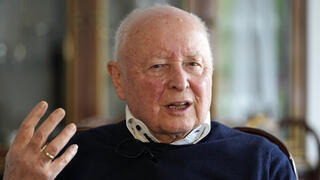 New US-based project features videos of survivors from around the globe reading Holocaust denial posts from different social media platforms amid growing antisemitism worldwide New US-based project features videos of survivors from around the globe reading Holocaust denial posts from different social media platforms amid growing antisemitism worldwide |
Ethan Hawke has made a movie as scandalous as one of the writer's short stories.
 Why not write something that “a lot, a lot, of people like?” Regina O’Connor asks her daughter, the writer Flannery O’Connor, in the middle of the new biopic Wildcat. The same question might be put to the film itself. It’s not a movie that a lot of people will like. But unlike the author’s mother, I mean that as a high compliment. Director and screenwriter Ethan Hawke has made a film worthy of Flannery O’Connor’s genius.An epigraph from O’Connor’s essay “The Nature and Aim of Fiction” sums up what Wildcat sets out to do: “I’m always irritated by people who imply writing fiction is an escape from reality. It is a plunge into reality.” Fittingly, rather than depict the writer’s life from birth to death, Wildcat uses her fiction to discover what’s real, to “get down under things” to the problem of suffering, the limitations of human experience, the desire for goodness, the habits of evil, and, always present, the longing for God.The result is a movie as scandalous as one of O’Connor’s short stories—“shocking to the system,” to borrow her words. Her devotees will applaud it; most of the audience will be left wondering what just clobbered them.After that opening epigraph, Wildcat rolls a fake trailer for a 1950s-style horror flick inspired by O’Connor’s story “The Comforts of Home.” (A mother brings home a wayward, orphaned teen who tries to seduce her grown son. The son attempts to kill the teen, but shoots his own mother instead.) The trailer, starring Laura Linney and Maya Hawke—who also play the roles of Regina and Flannery— sets up expectations ...Continue reading... Why not write something that “a lot, a lot, of people like?” Regina O’Connor asks her daughter, the writer Flannery O’Connor, in the middle of the new biopic Wildcat. The same question might be put to the film itself. It’s not a movie that a lot of people will like. But unlike the author’s mother, I mean that as a high compliment. Director and screenwriter Ethan Hawke has made a film worthy of Flannery O’Connor’s genius.An epigraph from O’Connor’s essay “The Nature and Aim of Fiction” sums up what Wildcat sets out to do: “I’m always irritated by people who imply writing fiction is an escape from reality. It is a plunge into reality.” Fittingly, rather than depict the writer’s life from birth to death, Wildcat uses her fiction to discover what’s real, to “get down under things” to the problem of suffering, the limitations of human experience, the desire for goodness, the habits of evil, and, always present, the longing for God.The result is a movie as scandalous as one of O’Connor’s short stories—“shocking to the system,” to borrow her words. Her devotees will applaud it; most of the audience will be left wondering what just clobbered them.After that opening epigraph, Wildcat rolls a fake trailer for a 1950s-style horror flick inspired by O’Connor’s story “The Comforts of Home.” (A mother brings home a wayward, orphaned teen who tries to seduce her grown son. The son attempts to kill the teen, but shoots his own mother instead.) The trailer, starring Laura Linney and Maya Hawke—who also play the roles of Regina and Flannery— sets up expectations ...Continue reading... |
Migrant rights have been off-radar for many Panamanian Christians. But as pressures increase, some are speaking out ahead of this weekend's general elections.
 On May 5, Panamanians will vote for a new president. The outcome of this election may have consequences for far more than its 4.4 million residents; it could change the migration reality for the hundreds of thousands of people traveling from South America, Asia, and Africa who pass through the Central American country en route to the United States.Leading in the polls is José Raúl Mulino, a candidate for Realizando Metas (Realizing Goals), a right-wing populist party founded by disgraced president Ricardo Martinelli. He has vowed to shut down the Darién Gap, a densely forested jungle area that migrants must traverse to enter Panama from the bordering country of Colombia.“We’re going to close Darién and we’re going to repatriate every one of these people, respecting their human rights,” said Raúl Mulino in April.For many Panamanians, there was no migrant crisis before 2022. After passing through the Darién gap, migrants passed through the country on government buses to the Costa Rican border. But after a shift in US migrant policy sent many back to Central America a couple years ago, hundreds have since moved to Panama City and a handful of small towns. Residents have begun to blame them for crime and for overwhelming their sanitation systems.Though evangelicals have largely been on the sidelines, many leaders say they should have done more.“The church does not see the refugee problem as their own problem,” said Panamanian missionary Robert Bruneau, a regional leader with United World Mission. “They believe it is something the state should do and are not aware of the great opportunity they have to graciously and honorably serve someone who ...Continue reading... On May 5, Panamanians will vote for a new president. The outcome of this election may have consequences for far more than its 4.4 million residents; it could change the migration reality for the hundreds of thousands of people traveling from South America, Asia, and Africa who pass through the Central American country en route to the United States.Leading in the polls is José Raúl Mulino, a candidate for Realizando Metas (Realizing Goals), a right-wing populist party founded by disgraced president Ricardo Martinelli. He has vowed to shut down the Darién Gap, a densely forested jungle area that migrants must traverse to enter Panama from the bordering country of Colombia.“We’re going to close Darién and we’re going to repatriate every one of these people, respecting their human rights,” said Raúl Mulino in April.For many Panamanians, there was no migrant crisis before 2022. After passing through the Darién gap, migrants passed through the country on government buses to the Costa Rican border. But after a shift in US migrant policy sent many back to Central America a couple years ago, hundreds have since moved to Panama City and a handful of small towns. Residents have begun to blame them for crime and for overwhelming their sanitation systems.Though evangelicals have largely been on the sidelines, many leaders say they should have done more.“The church does not see the refugee problem as their own problem,” said Panamanian missionary Robert Bruneau, a regional leader with United World Mission. “They believe it is something the state should do and are not aware of the great opportunity they have to graciously and honorably serve someone who ...Continue reading... |
Why the church has struggled to address mental illness well and how we can care better.
 Nearly five years ago, a high-profile pastor—one who had shared bravely and publicly about his battle with depression—took his own life. In the days after his death, a call circulated widely on social media platforms for clergy with mental health issues to be removed from their posts.I understand the motivation. The argument was made out of a concern to prevent similar tragedies. But as a pastor who has endured chronic mental torment, the simplistic appeal struck me as an example of the widespread clumsiness within the church when it comes to addressing mental illness. Prominent Christian teachers, most recently including California author and pastor John MacArthur, have denied diagnosable conditions such as OCD and ADHD even exist.In my own ministry, my struggles with anxiety and OCD have proven to be unexpectedly fertile soil for connecting with people. Opening up about the brokenness in my mind has led to deeper relationships as God took the affliction that initially felt to me like pure deficit and put it to work. His strength, as he tells us, shows up in our weakness (2 Cor. 12:9).So I find it heartening to see the increased attention to mental health and compassion for mental illness in our culture. Christian resources addressing the intersection of faith and mental illness are also proliferating, providing theologically grounded pathways to better care. And there are countless examples of congregations powerfully demonstrating the love of Christ to those in mental anguish.Still, the stigma accompanying mental illness persists, and in church settings, the issue is often complicated further by ignorance or misguided theology. Clergy tend to be the “first responders” ...Continue reading... Nearly five years ago, a high-profile pastor—one who had shared bravely and publicly about his battle with depression—took his own life. In the days after his death, a call circulated widely on social media platforms for clergy with mental health issues to be removed from their posts.I understand the motivation. The argument was made out of a concern to prevent similar tragedies. But as a pastor who has endured chronic mental torment, the simplistic appeal struck me as an example of the widespread clumsiness within the church when it comes to addressing mental illness. Prominent Christian teachers, most recently including California author and pastor John MacArthur, have denied diagnosable conditions such as OCD and ADHD even exist.In my own ministry, my struggles with anxiety and OCD have proven to be unexpectedly fertile soil for connecting with people. Opening up about the brokenness in my mind has led to deeper relationships as God took the affliction that initially felt to me like pure deficit and put it to work. His strength, as he tells us, shows up in our weakness (2 Cor. 12:9).So I find it heartening to see the increased attention to mental health and compassion for mental illness in our culture. Christian resources addressing the intersection of faith and mental illness are also proliferating, providing theologically grounded pathways to better care. And there are countless examples of congregations powerfully demonstrating the love of Christ to those in mental anguish.Still, the stigma accompanying mental illness persists, and in church settings, the issue is often complicated further by ignorance or misguided theology. Clergy tend to be the “first responders” ...Continue reading... |
A professor explains why examining a school's doctrinal statement isn't enough.
 When I speak at churches around the country, the conversation after my talks often turns to the state of Christian higher education. I’m a professor at a Christian institution, and Christian parents and grandparents want to know where high school graduates can go to have their faith deepened rather than undermined. These concerns have only become more pressing given the ongoing rise in young people wandering away from the church and describing their religious convictions as “nothing in particular.”The question many Christians have for me is which colleges are “safe” or “real” Christian schools, which usually means those that have a truly conservative theological ethos. For those who aren’t familiar with the world of Christian higher ed, it can be difficult to identify these schools from outside the campus community, and parents often (reasonably) conclude an institution’s stance on human sexuality is the simplest indicator of a college’s commitment to Christian orthodoxy.LGBTQ questions are indeed important, and they can serve as a proxy for an institution’s broader theology. But by itself, this isn’t a reliable formula for finding a good Christian college. A school may stake out a bold position on sexuality and yet capitulate to what I’d suggest is the most overlooked and therefore most insidious threat to Christian education in America right now.It’s not progressive theology. It’s a pervasive consumerist anthropology.Theological anthropology concerns our assumptions about the nature and purpose of humanity. And by “consumerist anthropology” I mean the belief—often subconsciously held—that ...Continue reading... When I speak at churches around the country, the conversation after my talks often turns to the state of Christian higher education. I’m a professor at a Christian institution, and Christian parents and grandparents want to know where high school graduates can go to have their faith deepened rather than undermined. These concerns have only become more pressing given the ongoing rise in young people wandering away from the church and describing their religious convictions as “nothing in particular.”The question many Christians have for me is which colleges are “safe” or “real” Christian schools, which usually means those that have a truly conservative theological ethos. For those who aren’t familiar with the world of Christian higher ed, it can be difficult to identify these schools from outside the campus community, and parents often (reasonably) conclude an institution’s stance on human sexuality is the simplest indicator of a college’s commitment to Christian orthodoxy.LGBTQ questions are indeed important, and they can serve as a proxy for an institution’s broader theology. But by itself, this isn’t a reliable formula for finding a good Christian college. A school may stake out a bold position on sexuality and yet capitulate to what I’d suggest is the most overlooked and therefore most insidious threat to Christian education in America right now.It’s not progressive theology. It’s a pervasive consumerist anthropology.Theological anthropology concerns our assumptions about the nature and purpose of humanity. And by “consumerist anthropology” I mean the belief—often subconsciously held—that ...Continue reading... |
The surprising argument that Saul of Tarsus was born into bondage.
 Of the many letters the apostle Paul wrote, few survived. We have a good deal of his communication to churches as a whole—letters to groups of believers in particular cities. This makes sense. Such letters were read publicly and often; they were copied and disseminated and celebrated as Scripture soon after the ink had dried.Paul sent a number of letters to individuals as well. To read his biblical writings is to sense that you are glimpsing only a fraction of his relational network and influence. Almost all of those letters have been lost.But there are exceptions.It was a tall order for personal letters to ascend to the level of canon. It helped to be bound up with a great figure, a leader of a great community. Timothy, for instance, was a towering second-generation church leader; he was also the bishop of Ephesus, a major city of the Roman Empire and a major Christian center. Titus was a pillar of the Gentile mission and served as the bishop of Crete. Their eponymous letters had huge communities to champion their inclusion in Scripture.A mystery for the ages, then, is why Paul’s letter to Philemon—the leader of a house church in the minor city of Colossae—survives at all. It’s the most personal letter we have from Paul. It runs only 25 verses.The letter reveals a story. In it, a man named Onesimus has fled his master Philemon. Onesimus was most likely a household slave, a bondservant high in the pecking order.To call him a runaway slave is true, though it is misleading for modern readers, who might imagine Onesimus attempting to escape through something like the Underground Railroad.In fact, some scholars argue that Onesimus sought out Paul but planned to return to his master. Steven M. Baugh, ...Continue reading... Of the many letters the apostle Paul wrote, few survived. We have a good deal of his communication to churches as a whole—letters to groups of believers in particular cities. This makes sense. Such letters were read publicly and often; they were copied and disseminated and celebrated as Scripture soon after the ink had dried.Paul sent a number of letters to individuals as well. To read his biblical writings is to sense that you are glimpsing only a fraction of his relational network and influence. Almost all of those letters have been lost.But there are exceptions.It was a tall order for personal letters to ascend to the level of canon. It helped to be bound up with a great figure, a leader of a great community. Timothy, for instance, was a towering second-generation church leader; he was also the bishop of Ephesus, a major city of the Roman Empire and a major Christian center. Titus was a pillar of the Gentile mission and served as the bishop of Crete. Their eponymous letters had huge communities to champion their inclusion in Scripture.A mystery for the ages, then, is why Paul’s letter to Philemon—the leader of a house church in the minor city of Colossae—survives at all. It’s the most personal letter we have from Paul. It runs only 25 verses.The letter reveals a story. In it, a man named Onesimus has fled his master Philemon. Onesimus was most likely a household slave, a bondservant high in the pecking order.To call him a runaway slave is true, though it is misleading for modern readers, who might imagine Onesimus attempting to escape through something like the Underground Railroad.In fact, some scholars argue that Onesimus sought out Paul but planned to return to his master. Steven M. Baugh, ...Continue reading... |
After years of disagreement and the departure of thousands of churches, the change passed without debate.
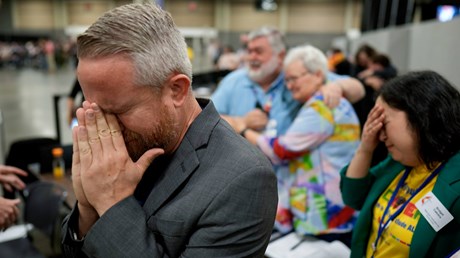 United Methodists meeting for their top legislative assembly Wednesday overwhelmingly overturned a measure that barred gay clergy from ordination in the denomination, a historic step for the nation’s second-largest Protestant body.With a simple vote call and without debate, delegates to the General Conference removed the ban on the ordination of “self-avowed practicing homosexuals”—a prohibition that dates to 1984.With that vote, the worldwide denomination of some 11 million members joins the majority of liberal Protestant denominations such as the Episcopal Church, the Presbyterian Church (USA), the Evangelical Lutheran Church in America, and the United Church of Christ, which also ordain LGBTQ clergy.“We’ve singled out one group for discrimination for 52 years,” said Ken Carter, bishop of the Western North Carolina Conference. “And we’ve done that on an understanding of homosexuality whose origins came when it was understood to be a disease and a disorder.”That, he said, has now changed. “Increasingly,” he said, “people see that God’s spirit is in gay and lesbian people.”The morning vote on the motion was part of a larger series of calendar items voted on in bulk. They also included a motion barring superintendents, or overseers, from punishing clergy for performing a same-sex wedding or prohibiting a church from holding a same-sex wedding, though the actual ban on same-sex weddings in churches has yet to be voted on.The vote on the calendar items was 692–51, or about 93 percent in favor.After the vote, LGBTQ delegates and their allies gathered on the floor of the Charlotte Convention Center to sing, hug, cheer, and shed tears. ...Continue reading... United Methodists meeting for their top legislative assembly Wednesday overwhelmingly overturned a measure that barred gay clergy from ordination in the denomination, a historic step for the nation’s second-largest Protestant body.With a simple vote call and without debate, delegates to the General Conference removed the ban on the ordination of “self-avowed practicing homosexuals”—a prohibition that dates to 1984.With that vote, the worldwide denomination of some 11 million members joins the majority of liberal Protestant denominations such as the Episcopal Church, the Presbyterian Church (USA), the Evangelical Lutheran Church in America, and the United Church of Christ, which also ordain LGBTQ clergy.“We’ve singled out one group for discrimination for 52 years,” said Ken Carter, bishop of the Western North Carolina Conference. “And we’ve done that on an understanding of homosexuality whose origins came when it was understood to be a disease and a disorder.”That, he said, has now changed. “Increasingly,” he said, “people see that God’s spirit is in gay and lesbian people.”The morning vote on the motion was part of a larger series of calendar items voted on in bulk. They also included a motion barring superintendents, or overseers, from punishing clergy for performing a same-sex wedding or prohibiting a church from holding a same-sex wedding, though the actual ban on same-sex weddings in churches has yet to be voted on.The vote on the calendar items was 692–51, or about 93 percent in favor.After the vote, LGBTQ delegates and their allies gathered on the floor of the Charlotte Convention Center to sing, hug, cheer, and shed tears. ...Continue reading... |
Every sin requires Christ's atonement. But the Bible shows God punishing—and repairing—different sins differently.
 Christian theology consistently holds together truths that seem to want to fall apart: Jesus is fully God and fully human. People are sinners and created in the image of God. The church is local and universal.And yet, despite what we affirm, in practice, Christians are often unable to walk and chew gum at the same time. Instead of holding two truths in tension, we tend to slide to one side or the other, distorting it in the process. We treat Jesus either as an invulnerable, transcendent being or as a mere prophet. We speak as if humans are either so degraded we are capable of nothing but sin or mostly fine with a few rough edges. We think of the church as if it were only our own sect or we minimize the local congregation.Evangelical theologians have done great work in Christology, anthropology, and ecclesiology, respectively, to retrieve those three truthful tensions. But there is a fourth tension yet to be retrieved: All sins ruin us, and yet not all sins ruin us equally.To start, let us be clear: Sin—however small—is a serious thing. And sin is only atoned for by the work of God in Jesus Christ. But saying that Christ is the only one who atones for all sin is different from saying that all sins do the same kind of work on us.All sins break the sinner and create havoc around us. And yet the Scriptures consistently depict the sins we do as different, not only in effect on one another but before God. Within the Law, for example, different social remedies are given for different sins, and so are different sacrifices (Lev. 4; Ex. 21). Not everything requires a bull or a goat. Sometimes a dove will do. In the Prophets and Proverbs, God distinguishes—and even prioritizes—certain ...Continue reading... Christian theology consistently holds together truths that seem to want to fall apart: Jesus is fully God and fully human. People are sinners and created in the image of God. The church is local and universal.And yet, despite what we affirm, in practice, Christians are often unable to walk and chew gum at the same time. Instead of holding two truths in tension, we tend to slide to one side or the other, distorting it in the process. We treat Jesus either as an invulnerable, transcendent being or as a mere prophet. We speak as if humans are either so degraded we are capable of nothing but sin or mostly fine with a few rough edges. We think of the church as if it were only our own sect or we minimize the local congregation.Evangelical theologians have done great work in Christology, anthropology, and ecclesiology, respectively, to retrieve those three truthful tensions. But there is a fourth tension yet to be retrieved: All sins ruin us, and yet not all sins ruin us equally.To start, let us be clear: Sin—however small—is a serious thing. And sin is only atoned for by the work of God in Jesus Christ. But saying that Christ is the only one who atones for all sin is different from saying that all sins do the same kind of work on us.All sins break the sinner and create havoc around us. And yet the Scriptures consistently depict the sins we do as different, not only in effect on one another but before God. Within the Law, for example, different social remedies are given for different sins, and so are different sacrifices (Lev. 4; Ex. 21). Not everything requires a bull or a goat. Sometimes a dove will do. In the Prophets and Proverbs, God distinguishes—and even prioritizes—certain ...Continue reading... |
After years of disagreement and the departure of thousands of churches, the change passed without debate.
 United Methodists meeting for their top legislative assembly Wednesday overwhelmingly overturned a measure that barred gay clergy from ordination in the denomination, a historic step for the nation’s second-largest Protestant body.With a simple vote call and without debate, delegates to the General Conference removed the ban on the ordination of “self-avowed practicing homosexuals”—a prohibition that dates to 1984.With that vote, the worldwide denomination of some 11 million members joins the majority of liberal Protestant denominations such as the Episcopal Church, the Presbyterian Church (USA), the Evangelical Lutheran Church in America, and the United Church of Christ, which also ordain LGBTQ clergy.“We’ve singled out one group for discrimination for 52 years,” said Ken Carter, bishop of the Western North Carolina Conference. “And we’ve done that on an understanding of homosexuality whose origins came when it was understood to be a disease and a disorder.”That, he said, has now changed. “Increasingly,” he said, “people see that God’s spirit is in gay and lesbian people.”The morning vote on the motion was part of a larger series of calendar items voted on in bulk. They also included a motion barring superintendents, or overseers, from punishing clergy for performing a same-sex wedding or prohibiting a church from holding a same-sex wedding, though the actual ban on same-sex weddings in churches has yet to be voted on.The vote on the calendar items was 692–51, or about 93 percent in favor.After the vote, LGBTQ delegates and their allies gathered on the floor of the Charlotte Convention Center to sing, hug, cheer, and shed tears. ...Continue reading... United Methodists meeting for their top legislative assembly Wednesday overwhelmingly overturned a measure that barred gay clergy from ordination in the denomination, a historic step for the nation’s second-largest Protestant body.With a simple vote call and without debate, delegates to the General Conference removed the ban on the ordination of “self-avowed practicing homosexuals”—a prohibition that dates to 1984.With that vote, the worldwide denomination of some 11 million members joins the majority of liberal Protestant denominations such as the Episcopal Church, the Presbyterian Church (USA), the Evangelical Lutheran Church in America, and the United Church of Christ, which also ordain LGBTQ clergy.“We’ve singled out one group for discrimination for 52 years,” said Ken Carter, bishop of the Western North Carolina Conference. “And we’ve done that on an understanding of homosexuality whose origins came when it was understood to be a disease and a disorder.”That, he said, has now changed. “Increasingly,” he said, “people see that God’s spirit is in gay and lesbian people.”The morning vote on the motion was part of a larger series of calendar items voted on in bulk. They also included a motion barring superintendents, or overseers, from punishing clergy for performing a same-sex wedding or prohibiting a church from holding a same-sex wedding, though the actual ban on same-sex weddings in churches has yet to be voted on.The vote on the calendar items was 692–51, or about 93 percent in favor.After the vote, LGBTQ delegates and their allies gathered on the floor of the Charlotte Convention Center to sing, hug, cheer, and shed tears. ...Continue reading... |
As the presidential election approaches, the incumbent government seeks to win support with aid to churches and pastors.
 In many countries, politicians try to win over religious voters by highlighting areas of shared interest between their agenda and the faithful’s priorities. In Venezuela, candidates are offering pastors cash.With less than three months until Venezuela’s presidential elections, incumbent Nicolás Maduro is expanding two initiatives specifically aimed at the evangelical community, which represents 30.9 percent of the country’s population.Bono El Buen Pastor (“The Good Shepherd Bonus”), created last year, and Plan Mi Iglesia Bien Equipada (“My Well-Equipped Church Plan”) offer resources to pastors and their churches, including cash, chairs, construction materials, and expensive sound equipment—no strings attached. Mi Iglesia Bien Equipada exists under Misión Venezuela Bella, a government program that invests in recreation and arts spaces, which has remodeled nearly 3,000 churches since 2019.At the beginning of March, Maduro gathered 17,000 people in a pastors-only event in the northern city of Carabobo and announced that 20,000 additional pastors had become beneficiaries of the Bono El Buen Pastor program, which would deliver a monthly stipend of 495 bolivars (around $14 USD) to each new member. (Venezuela’s minimum legal monthly wage is 130 bolivars or $3.50.)Officially, the government says the program aims to give churchgoers dignified spaces where they can develop their faith. There are, however, those who view the state’s generosity with some suspicion.César Mermejo, president of the Evangelical Council of Venezuela and a leader of the Federación de Iglesias Mizpa de Venezuela, called these efforts by Maduro an attempt to buy the souls ...Continue reading... In many countries, politicians try to win over religious voters by highlighting areas of shared interest between their agenda and the faithful’s priorities. In Venezuela, candidates are offering pastors cash.With less than three months until Venezuela’s presidential elections, incumbent Nicolás Maduro is expanding two initiatives specifically aimed at the evangelical community, which represents 30.9 percent of the country’s population.Bono El Buen Pastor (“The Good Shepherd Bonus”), created last year, and Plan Mi Iglesia Bien Equipada (“My Well-Equipped Church Plan”) offer resources to pastors and their churches, including cash, chairs, construction materials, and expensive sound equipment—no strings attached. Mi Iglesia Bien Equipada exists under Misión Venezuela Bella, a government program that invests in recreation and arts spaces, which has remodeled nearly 3,000 churches since 2019.At the beginning of March, Maduro gathered 17,000 people in a pastors-only event in the northern city of Carabobo and announced that 20,000 additional pastors had become beneficiaries of the Bono El Buen Pastor program, which would deliver a monthly stipend of 495 bolivars (around $14 USD) to each new member. (Venezuela’s minimum legal monthly wage is 130 bolivars or $3.50.)Officially, the government says the program aims to give churchgoers dignified spaces where they can develop their faith. There are, however, those who view the state’s generosity with some suspicion.César Mermejo, president of the Evangelical Council of Venezuela and a leader of the Federación de Iglesias Mizpa de Venezuela, called these efforts by Maduro an attempt to buy the souls ...Continue reading... |
In Reversing Entropy, the 95-year-old poet looks lovingly at creation.
 Luci Shaw is a legend in Christian literary circles. Her many volumes of poetry—named for rivers and clay, the color green, the glint of seaglass—speak to the beauty of creation and the generosity of the Creator. She has written on faith and art, the Christian imagination, and prayer, including a few books co-authored with her friend, Madeleine L’Engle. Shaw is also a beloved teacher, serving as longtime writer-in-residence at Regent College.Speaking with the poet about her latest collection Reversing Entropy (out this spring from Paraclete Press), I understood how she has served as an inspiration for generations of students and readers. She’s gentle, curious, and wise. Her way of seeing the world is wondrous—everything from lichens, to a shivering little lake, to “jewel dew” in the grass, is significant. All the world inspires praise.Reversing Entropy doesn’t just look around; it looks ahead. Luci Shaw is 95 years old, and this collection is understandably full of endings. Leaves fall; ripe apricots drop from a tree; her brother passes away. There is “the inevitable decay / the leaving and the dying.”But there’s also hope. From the collection’s final entry, a long, tumbling prose poem that Shaw says “poured out” of her “like a gift”:Give praise, now, to our God, the Quickener, the One who stirs us into such new life that we, and all creation, may wake to the sound of a fresh music, and start to sing again the songs of love, and longing, and refreshment. …Come Springtime, that most beneficent of seasons, all, everything, every thing, will be thawing, rising, joyful, laughing, tuning up for the evermore, and in every green ...Continue reading... Luci Shaw is a legend in Christian literary circles. Her many volumes of poetry—named for rivers and clay, the color green, the glint of seaglass—speak to the beauty of creation and the generosity of the Creator. She has written on faith and art, the Christian imagination, and prayer, including a few books co-authored with her friend, Madeleine L’Engle. Shaw is also a beloved teacher, serving as longtime writer-in-residence at Regent College.Speaking with the poet about her latest collection Reversing Entropy (out this spring from Paraclete Press), I understood how she has served as an inspiration for generations of students and readers. She’s gentle, curious, and wise. Her way of seeing the world is wondrous—everything from lichens, to a shivering little lake, to “jewel dew” in the grass, is significant. All the world inspires praise.Reversing Entropy doesn’t just look around; it looks ahead. Luci Shaw is 95 years old, and this collection is understandably full of endings. Leaves fall; ripe apricots drop from a tree; her brother passes away. There is “the inevitable decay / the leaving and the dying.”But there’s also hope. From the collection’s final entry, a long, tumbling prose poem that Shaw says “poured out” of her “like a gift”:Give praise, now, to our God, the Quickener, the One who stirs us into such new life that we, and all creation, may wake to the sound of a fresh music, and start to sing again the songs of love, and longing, and refreshment. …Come Springtime, that most beneficent of seasons, all, everything, every thing, will be thawing, rising, joyful, laughing, tuning up for the evermore, and in every green ...Continue reading... |
by? Patricia Burke? of? Safe Tech International Excessive screen time has been directly linked to eye damage. In addition, reading in a moving vehicle is associated with motion...The FCC is the Bully Boarding the School Bus: The Eyes are (Not) Having It
|
by? Patricia Burke? of? Safe Tech International Excessive screen time has been directly linked to eye damage. In addition, reading in a moving vehicle is associated with motion...The FCC is the Bully Boarding the School Bus: The Eyes are (Not) Having It
|
As the presidential election approaches, the incumbent government seeks to win support with aid to churches and pastors.
 In many countries, politicians try to win over religious voters by highlighting areas of shared interest between their agenda and the faithful’s priorities. In Venezuela, candidates are offering pastors cash.With less than three months until Venezuela’s presidential elections, incumbent Nicolás Maduro is expanding two initiatives specifically aimed at the evangelical community, which represents 30.9 percent of the country’s population.Bono El Buen Pastor (“The Good Shepherd Bonus”), created last year, and Plan Mi Iglesia Bien Equipada (“My Well-Equipped Church Plan”) offer resources to pastors and their churches, including cash, chairs, construction materials, and expensive sound equipment—no strings attached. Mi Iglesia Bien Equipada exists under Misión Venezuela Bella, a government program that invests in recreation and arts spaces, which has remodeled nearly 3,000 churches since 2019.At the beginning of March, Maduro gathered 17,000 people in a pastors-only event in the northern city of Carabobo and announced that 20,000 additional pastors had become beneficiaries of the Bono El Buen Pastor program, which would deliver a monthly stipend of 495 bolivars (around $14 USD) to each new member. (Venezuela’s minimum legal monthly wage is 130 bolivars or $3.50.)Officially, the government says the program aims to give churchgoers dignified spaces where they can develop their faith. There are, however, those who view the state’s generosity with some suspicion.César Mermejo, president of the Evangelical Council of Venezuela and a leader of the Federación de Iglesias Mizpa de Venezuela, called these efforts by Maduro an attempt to buy the souls ...Continue reading... In many countries, politicians try to win over religious voters by highlighting areas of shared interest between their agenda and the faithful’s priorities. In Venezuela, candidates are offering pastors cash.With less than three months until Venezuela’s presidential elections, incumbent Nicolás Maduro is expanding two initiatives specifically aimed at the evangelical community, which represents 30.9 percent of the country’s population.Bono El Buen Pastor (“The Good Shepherd Bonus”), created last year, and Plan Mi Iglesia Bien Equipada (“My Well-Equipped Church Plan”) offer resources to pastors and their churches, including cash, chairs, construction materials, and expensive sound equipment—no strings attached. Mi Iglesia Bien Equipada exists under Misión Venezuela Bella, a government program that invests in recreation and arts spaces, which has remodeled nearly 3,000 churches since 2019.At the beginning of March, Maduro gathered 17,000 people in a pastors-only event in the northern city of Carabobo and announced that 20,000 additional pastors had become beneficiaries of the Bono El Buen Pastor program, which would deliver a monthly stipend of 495 bolivars (around $14 USD) to each new member. (Venezuela’s minimum legal monthly wage is 130 bolivars or $3.50.)Officially, the government says the program aims to give churchgoers dignified spaces where they can develop their faith. There are, however, those who view the state’s generosity with some suspicion.César Mermejo, president of the Evangelical Council of Venezuela and a leader of the Federación de Iglesias Mizpa de Venezuela, called these efforts by Maduro an attempt to buy the souls ...Continue reading... |
As the presidential election approaches, the incumbent government seeks to win support with aid to churches and pastors.
 In many countries, politicians try to win over religious voters by highlighting areas of shared interest between their agenda and the faithful’s priorities. In Venezuela, candidates are offering pastors cash.With less than three months until Venezuela’s presidential elections, incumbent Nicolás Maduro is expanding two initiatives specifically aimed at the evangelical community, which represents 30.9 percent of the country’s population.Bono El Buen Pastor (“The Good Shepherd Bonus”), created last year, and Plan Mi Iglesia Bien Equipada (“My Well-Equipped Church Plan”) offer resources to pastors and their churches, including cash, chairs, construction materials, and expensive sound equipment—no strings attached. Mi Iglesia Bien Equipada exists under Misión Venezuela Bella, a government program that invests in recreation and arts spaces, which has remodeled nearly 3,000 churches since 2019.At the beginning of March, Maduro gathered 17,000 people in a pastors-only event in the northern city of Carabobo and announced that 20,000 additional pastors had become beneficiaries of the Bono El Buen Pastor program, which would deliver a monthly stipend of 495 bolivars (around $14 USD) to each new member. (Venezuela’s minimum legal monthly wage is 130 bolivars or $3.50.)Officially, the government says the program aims to give churchgoers dignified spaces where they can develop their faith. There are, however, those who view the state’s generosity with some suspicion.César Mermejo, president of the Evangelical Council of Venezuela and a leader of the Federación de Iglesias Mizpa de Venezuela, called these efforts by Maduro an attempt to buy the souls ...Continue reading... In many countries, politicians try to win over religious voters by highlighting areas of shared interest between their agenda and the faithful’s priorities. In Venezuela, candidates are offering pastors cash.With less than three months until Venezuela’s presidential elections, incumbent Nicolás Maduro is expanding two initiatives specifically aimed at the evangelical community, which represents 30.9 percent of the country’s population.Bono El Buen Pastor (“The Good Shepherd Bonus”), created last year, and Plan Mi Iglesia Bien Equipada (“My Well-Equipped Church Plan”) offer resources to pastors and their churches, including cash, chairs, construction materials, and expensive sound equipment—no strings attached. Mi Iglesia Bien Equipada exists under Misión Venezuela Bella, a government program that invests in recreation and arts spaces, which has remodeled nearly 3,000 churches since 2019.At the beginning of March, Maduro gathered 17,000 people in a pastors-only event in the northern city of Carabobo and announced that 20,000 additional pastors had become beneficiaries of the Bono El Buen Pastor program, which would deliver a monthly stipend of 495 bolivars (around $14 USD) to each new member. (Venezuela’s minimum legal monthly wage is 130 bolivars or $3.50.)Officially, the government says the program aims to give churchgoers dignified spaces where they can develop their faith. There are, however, those who view the state’s generosity with some suspicion.César Mermejo, president of the Evangelical Council of Venezuela and a leader of the Federación de Iglesias Mizpa de Venezuela, called these efforts by Maduro an attempt to buy the souls ...Continue reading... |
But true liberty, in art and in life, is created by constraints.
 Taylor Swift answers to no one.Not music industry executives: Her songs returned to TikTok in the middle of a licensing dispute between the app and her label.Not mayors: When she graced their cities during her Eras tour, they declared days in her honor.Not the international community: A Singapore-exclusive stop in Southeast Asia sparked a row between the city-state and nearby Thailand and the Philippines. The Japanese embassy issued a statement about her Super Bowl travel plans.And Swift doesn’t plan on stopping anytime soon. She announced new music within minutes of winning her latest Grammy for album of the year.You might take all this as proof of Swift’s business genius, nothing personal. But in her latest album, The Tortured Poets Department, there’s definitely an “above it all” attitude. These songs are snarly. America’s sweetheart may have nothing left to prove. But she certainly has scores left to settle.Swift is hardly a stranger to revenge. This is the songwriter, after all, who brought us lyrics like “It’s obvious that wanting me dead / Has really brought you two together.”But TTPD broadens her aggression and scorns the prospect of reconciliation. A small-town girl takes on her community over a controversial love affair and trolls her parents with a joke pregnancy announcement. A depressed performer boasts sardonically about how well she can sell happiness to frenzied fans. A woman seethes at being seen as a problematic starlet by her new boyfriend’s circle.There’s a track suspiciously similar to an Olivia Rodrigo song (the two singers have a rumored feud). The title of another appears to name-drop Kim Kardashian, an older nemesis.Critics agree that ...Continue reading... Taylor Swift answers to no one.Not music industry executives: Her songs returned to TikTok in the middle of a licensing dispute between the app and her label.Not mayors: When she graced their cities during her Eras tour, they declared days in her honor.Not the international community: A Singapore-exclusive stop in Southeast Asia sparked a row between the city-state and nearby Thailand and the Philippines. The Japanese embassy issued a statement about her Super Bowl travel plans.And Swift doesn’t plan on stopping anytime soon. She announced new music within minutes of winning her latest Grammy for album of the year.You might take all this as proof of Swift’s business genius, nothing personal. But in her latest album, The Tortured Poets Department, there’s definitely an “above it all” attitude. These songs are snarly. America’s sweetheart may have nothing left to prove. But she certainly has scores left to settle.Swift is hardly a stranger to revenge. This is the songwriter, after all, who brought us lyrics like “It’s obvious that wanting me dead / Has really brought you two together.”But TTPD broadens her aggression and scorns the prospect of reconciliation. A small-town girl takes on her community over a controversial love affair and trolls her parents with a joke pregnancy announcement. A depressed performer boasts sardonically about how well she can sell happiness to frenzied fans. A woman seethes at being seen as a problematic starlet by her new boyfriend’s circle.There’s a track suspiciously similar to an Olivia Rodrigo song (the two singers have a rumored feud). The title of another appears to name-drop Kim Kardashian, an older nemesis.Critics agree that ...Continue reading... |
A late historian explores how crusade hymns told both the classic story of gospel salvation and the evolving story of evangelical worship music.
 Crowds of over 50,000. Famous special guests. Hundreds of cities in the US and around the world. Beloved, catchy songs. For many, these might sound like readouts from the Taylor Swift Eras Tour hype machine. But exchange the glittery girl power for the gospel in baritone, and you have one of the most successful musical touring acts in the postwar world: the Billy Graham Crusades.The first association that “Billy Graham Crusade” may evoke is not musical at all, but rather a close-up shot of the evangelist, with his penetrating, wide-eyed gaze and raised forearms, thundering, “The Bible says …” Admittedly, music was not the main focus.Yet as the late historian Edith Blumhofer shows in her final book, Songs I Love to Sing: The Billy Graham Crusades and the Shaping of Modern Worship, neither Graham’s ministry nor the late-century rise of contemporary Christian music can be understood without it. As crusade song leader Cliff Barrows pursued his main goal—“sing to save”—he and his teammates bridged stylistic, cultural, and generational divides, transforming evangelicals’ music into the harmonic blend of old and new that is familiar today.Mining rich resourcesBefore unpacking this highly original book, a few words about the author. Blumhofer is an American religious historian renowned for her empathetic biographies of hymnist Fanny J. Crosby and evangelist Aimee Semple McPherson, as well as broader studies of evangelicalism and Pentecostalism. She concluded her career with this new study, sadly succumbing to a battle with cancer in the process.To finish the project, she tapped Jesus People expert Larry Eskridge, with whom she had for many years directed the Institute ...Continue reading... Crowds of over 50,000. Famous special guests. Hundreds of cities in the US and around the world. Beloved, catchy songs. For many, these might sound like readouts from the Taylor Swift Eras Tour hype machine. But exchange the glittery girl power for the gospel in baritone, and you have one of the most successful musical touring acts in the postwar world: the Billy Graham Crusades.The first association that “Billy Graham Crusade” may evoke is not musical at all, but rather a close-up shot of the evangelist, with his penetrating, wide-eyed gaze and raised forearms, thundering, “The Bible says …” Admittedly, music was not the main focus.Yet as the late historian Edith Blumhofer shows in her final book, Songs I Love to Sing: The Billy Graham Crusades and the Shaping of Modern Worship, neither Graham’s ministry nor the late-century rise of contemporary Christian music can be understood without it. As crusade song leader Cliff Barrows pursued his main goal—“sing to save”—he and his teammates bridged stylistic, cultural, and generational divides, transforming evangelicals’ music into the harmonic blend of old and new that is familiar today.Mining rich resourcesBefore unpacking this highly original book, a few words about the author. Blumhofer is an American religious historian renowned for her empathetic biographies of hymnist Fanny J. Crosby and evangelist Aimee Semple McPherson, as well as broader studies of evangelicalism and Pentecostalism. She concluded her career with this new study, sadly succumbing to a battle with cancer in the process.To finish the project, she tapped Jesus People expert Larry Eskridge, with whom she had for many years directed the Institute ...Continue reading... |
NIL deals in college athletics present new challenges—and opportunities—for colleges and students.
 When Deverin Muff played Division I college basketball at Eastern Kentucky University, student athletes weren’t allowed to earn money off their name, image, and likeness (NIL)—their personal brand.Now he’s a professor at the university, and some of the players in his classes have agents. An NCAA policy change in 2021—heralded by Muff and other Christian athletes as a matter of fairness—allows college athletes to earn money beyond financial aid or scholarships.“This is a matter of justice, frankly. … It righted a historic wrong,” said Pepperdine University sports administration professor Alicia Jessop. College sports, especially football and basketball, draw in billions in revenue.Christians in college athletics have welcomed the change to allow NIL deals, according to interviews with CT. But they are also navigating an unknown landscape and finding challenges along the way. The NCAA itself is still reeling from the resulting shifts in the economics of college sports, passing additional NIL rules just last week.Jessop was recently teaching a class on NIL deals at Pepperdine, where she is also the faculty representative to the NCAA. One student decided to put the class into practice immediately and reached out to a sunglasses brand to pitch a deal. In a short time, the student had a free pair of sunglasses delivered.“It’s a teaching tool,” said Jessop. “They think they’re learning about NIL so they’re focused, but they’re getting a whole business curriculum put in front of them.”Under the new NCAA rules passed last week, schools can be more directly involved in NIL deals and they can offer a support system that helps educate students ...Continue reading... When Deverin Muff played Division I college basketball at Eastern Kentucky University, student athletes weren’t allowed to earn money off their name, image, and likeness (NIL)—their personal brand.Now he’s a professor at the university, and some of the players in his classes have agents. An NCAA policy change in 2021—heralded by Muff and other Christian athletes as a matter of fairness—allows college athletes to earn money beyond financial aid or scholarships.“This is a matter of justice, frankly. … It righted a historic wrong,” said Pepperdine University sports administration professor Alicia Jessop. College sports, especially football and basketball, draw in billions in revenue.Christians in college athletics have welcomed the change to allow NIL deals, according to interviews with CT. But they are also navigating an unknown landscape and finding challenges along the way. The NCAA itself is still reeling from the resulting shifts in the economics of college sports, passing additional NIL rules just last week.Jessop was recently teaching a class on NIL deals at Pepperdine, where she is also the faculty representative to the NCAA. One student decided to put the class into practice immediately and reached out to a sunglasses brand to pitch a deal. In a short time, the student had a free pair of sunglasses delivered.“It’s a teaching tool,” said Jessop. “They think they’re learning about NIL so they’re focused, but they’re getting a whole business curriculum put in front of them.”Under the new NCAA rules passed last week, schools can be more directly involved in NIL deals and they can offer a support system that helps educate students ...Continue reading... |
The plan would organize UMC churches in four global regions, with each given more leeway around same-sex marriage and other theological issues.
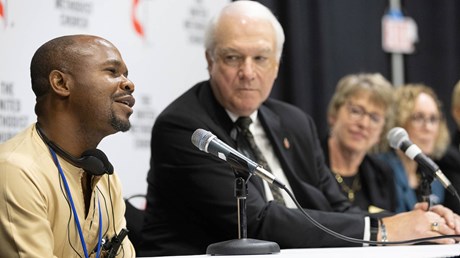 The top legislative body of the United Methodist Church passed a series of measures Thursday to restructure the worldwide denomination to give each region greater equity in tailoring church life to its own customs and traditions.The primary measure, voted on as the UMC General Conference met at the Charlotte Convention Center in North Carolina, was an amendment to the church’s constitution to divide the denomination into four equal regions—Africa, Europe, the Philippines, and the United States.According to the plan, each region would be able to customize part of the denomination’s rulebook, the Book of Discipline, to fit local needs. While church regions in Africa, the Philippines, and Europe have already enjoyed some leeway in customizing church life, the United States has not.The vote on the constitutional amendment passed 586–164, or by 78 percent, which means it surpassed the two-thirds majority needed for constitutional amendments. It must now go before each smaller church region, called an annual conference, for ratification by the end of 2025.If ratified by two-thirds of delegates to the annual conferences, the restructuring would allow the four regions to set their own qualifications for ordaining clergy and lay leaders; publish their own hymnal and rituals, including rites for marriage; and establish its own judicial courts. A new Book of Discipline would have one section that could be revised and tailored for each of the four regional conferences.The two-week worldwide meeting is the first meeting of the General Conference in five years, due mostly to delays associated with the COVID-19 pandemic. It follows a painful schism that has split some 7,600 US-based churches from the denomination—a ...Continue reading... The top legislative body of the United Methodist Church passed a series of measures Thursday to restructure the worldwide denomination to give each region greater equity in tailoring church life to its own customs and traditions.The primary measure, voted on as the UMC General Conference met at the Charlotte Convention Center in North Carolina, was an amendment to the church’s constitution to divide the denomination into four equal regions—Africa, Europe, the Philippines, and the United States.According to the plan, each region would be able to customize part of the denomination’s rulebook, the Book of Discipline, to fit local needs. While church regions in Africa, the Philippines, and Europe have already enjoyed some leeway in customizing church life, the United States has not.The vote on the constitutional amendment passed 586–164, or by 78 percent, which means it surpassed the two-thirds majority needed for constitutional amendments. It must now go before each smaller church region, called an annual conference, for ratification by the end of 2025.If ratified by two-thirds of delegates to the annual conferences, the restructuring would allow the four regions to set their own qualifications for ordaining clergy and lay leaders; publish their own hymnal and rituals, including rites for marriage; and establish its own judicial courts. A new Book of Discipline would have one section that could be revised and tailored for each of the four regional conferences.The two-week worldwide meeting is the first meeting of the General Conference in five years, due mostly to delays associated with the COVID-19 pandemic. It follows a painful schism that has split some 7,600 US-based churches from the denomination—a ...Continue reading... |
After lobbying from fellow Southern Baptists and Christians affected by the war, the House speaker moves a package forward.
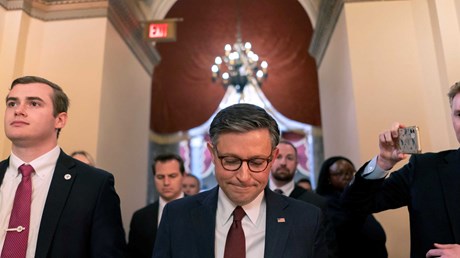 When deciding whether to protect his place in leadership as House speaker or go against his party to do what he believed was right, Mike Johnson turned to prayer.After weeks of hearing intelligence briefings and pleas from fellow Christians, Johnson ultimately sided with his convictions rather than conceding to the Republican Party’s isolationist wing. He backed a $95 billion foreign aid package that, despite the opposition of 112 GOP legislators, overwhelmingly passed the House of Representatives last weekend.Like many of his fellow Republicans, Johnson had initially opposed further aid to Ukraine, voting against it prior to becoming speaker and waiting months to move forward with an aid package after the Senate approved its version in February.He “went through a transformation,” according to one GOP colleague, House Foreign Affairs Committee chairman Michael McCaul. The shift may have come in part due to the influence of Ukrainian evangelicals, fellow Christian leaders, and his personal faith.“He got down on his knees, and he prayed for guidance and said, ‘Look, tell me. What is the right thing to do here?’” the Texas congressman told NOTUS’s Haley Byrd Wilt. The next day, Johnson said to McCaul, “I want to be on the right side of history.”The House vote on the Ukraine provisions, around $61 billion, was 311 to 112; a majority of Johnson’s colleagues voted against the measure, while aid to Israel and Taiwan had broader support. The Senate cleared the package Tuesday in a bipartisan 79–18 vote. Now the measure heads to President Joe Biden’s desk.Ukrainian leadership had grown more vocal about depleted weapons two years ...Continue reading... When deciding whether to protect his place in leadership as House speaker or go against his party to do what he believed was right, Mike Johnson turned to prayer.After weeks of hearing intelligence briefings and pleas from fellow Christians, Johnson ultimately sided with his convictions rather than conceding to the Republican Party’s isolationist wing. He backed a $95 billion foreign aid package that, despite the opposition of 112 GOP legislators, overwhelmingly passed the House of Representatives last weekend.Like many of his fellow Republicans, Johnson had initially opposed further aid to Ukraine, voting against it prior to becoming speaker and waiting months to move forward with an aid package after the Senate approved its version in February.He “went through a transformation,” according to one GOP colleague, House Foreign Affairs Committee chairman Michael McCaul. The shift may have come in part due to the influence of Ukrainian evangelicals, fellow Christian leaders, and his personal faith.“He got down on his knees, and he prayed for guidance and said, ‘Look, tell me. What is the right thing to do here?’” the Texas congressman told NOTUS’s Haley Byrd Wilt. The next day, Johnson said to McCaul, “I want to be on the right side of history.”The House vote on the Ukraine provisions, around $61 billion, was 311 to 112; a majority of Johnson’s colleagues voted against the measure, while aid to Israel and Taiwan had broader support. The Senate cleared the package Tuesday in a bipartisan 79–18 vote. Now the measure heads to President Joe Biden’s desk.Ukrainian leadership had grown more vocal about depleted weapons two years ...Continue reading... |



 Links
Links  Articles
Articles  Blogs
Blogs  Videos
Videos  News
News  Colors
Colors 

 New links
New links

